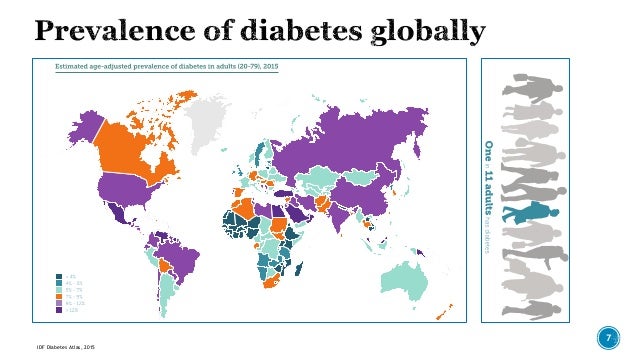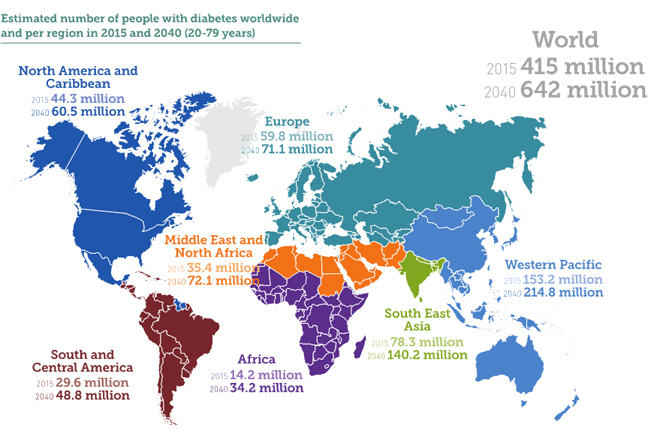Epidemiology Diabetes
The latest estimates show a global prevalence of 382 million people with diabetes in 2013, expected to rise to 592 million by 2035. the aetiological classification of diabetes has now been widely accepted. type 1 and type 2 diabetes are the two main types, with type 2 diabetes accounting for the majority (>85%) of total diabetes prevalence. anesthetist critical care medicine dermatology emergency medicine endocrinology, diabetes & metabolism epidemiology family practice gastroenterology general practice geriatrics hematology hepatology Data from this report provide vital perspectives on the current status of diabetes and can help focus prevention and management efforts going forward. new in 2020, the report features trends in prevalence and incidence estimates epidemiology diabetes over time. key findings include: 34. 2 million americans—just over 1 in 10—have diabetes.
V. diabetes: introduction. the epidemiology of diabetes in pregnancy has changed. previously, type 1 diabetes mellitus (dm) was more recognized in pregnancy. however, with the national epidemic of obesity, type 2 dm is more prevalent. this is particularly true in immigrant and low-income communities commonly cared for by family physicians. dm. Prevalence of type 2 diabetes in the u. s. approximately 30. 3 million people (23 million diagnosed, 7. 2 million undiagnosed) have diabetes. in 2015, 9. 4% of the u. s. population had a diagnosis of diabetes. approximately 84. 1 million adults aged 18 years or older had prediabetes in 2015, based on their fasting glucose or a1c level. medical science, including the pathophysiology of type 2 diabetes, epidemiology, and etiology the death to diabetes wellness program is a science based program that Diabetes prevalence has been rising more rapidly in lowand middle-income countries than in high-income countries. diabetes is a major cause of blindness, kidney failure, heart attacks, stroke and lower limb amputation. in 2016, an estimated 1. 6 million deaths were directly caused by diabetes.
See full list on diabetes. org. The latest data on diabetes incidence, prevalence, complications, costs, and more. diabetes report card current information on diabetes and prediabetes at the national and state levels. The rising burden of type 2 diabetes is a major concern in epidemiology diabetes healthcare worldwide. this research aimed to analyze the global epidemiology of type 2 diabetes. we analyzed the incidence, prevalence, and burden of suffering of diabetes mellitus based on epidemiological data from the global burden of dise. More diabetes epidemiology images.
Epidemiology of type 2 diabetes answers are found in the johns hopkins diabetes guide powered by unbound medicine. available for iphone, ipad, android, and web. The global prevalence of diabetes* among adults over 18 years of age rose from 4. 7% in 1980 to 8. 5% in 2014 (1). between 2000 and 2016, there was a 5% increase in premature mortality from diabetes. diabetes prevalence has been rising more rapidly in lowand middle-income countries than in high-income countries.
Statistics About Diabetes Ada
United South Eastern Tribes Because There Is Strength In Unity

The latest data on diabetes incidence, prevalence, complications, costs, and more. diabetes report card. current information on diabetes and prediabetes at the national and state levels. diabetes and obesity maps. download maps of diabetes and obesity, by county, in 2004, 2010, and 2016. Overall numbers. prevalence: in 2018, 34. 2 million americans, or 10. 5% of the population, had diabetes.. nearly 1. 6 million americans have type 1 diabetes, including about 187,000 children and adolescents; undiagnosed: of the 34. 2 million adults with diabetes, 26. 8 million were diagnosed, and 7. 3 million were undiagnosed. ; prevalence in seniors: the percentage of americans age 65 and older. Abstract. the disease burden related to diabetes is high and rising in every country, fuelled by the global rise in the prevalence of obesity and unhealthy lifestyles. the latest estimates show a global prevalence of 382 million people with diabetes in 2013, expected to rise to 592 million by 2035. the aetiological classification of diabetes has now been widely accepted.
More than 34 million americans have diabetes (about 1 in 10), and approximately 90-95% of them have type 2 diabetes. type 2 diabetes most often develops in people over age 45, but more and more children, teens, and young adults are also developing it.. what causes type 2 diabetes?. New diabetes cases were higher among non-hispanic blacks and people of hispanic origin than non-hispanic asians and non-hispanic whites. for adults diagnosed with diabetes: new cases significantly decreased from 2008 through 2018. the percentage of existing cases was highest among american indians/alaska natives. Epidemiology provides a scientific basis for clinical and public health practice. indeed, epidemiology can be used to guide how we define, diagnose, and screen for diabetes, to describe the present and future burden of diabetes, and to highlight opportunities for intervention. Epidemiology provides a scientific basis for clinical and public health practice. indeed, epidemiology can be used to guide how we define, diagnose, and screen for diabetes, to describe the present and future burden of diabetes, and to highlight opportunities for intervention. diabetes is a group of disorders characterized by high glucose levels that cause unique eye, kidney, and nerve.
The disease burden related to diabetes is high and rising in every country, fuelled by the global rise in the prevalence of obesity and unhealthy lifestyles. the latest estimates show a global prevalence of 382 million people with diabetes in 2013, expected to rise to 592 million by 2035. the aetiol. care medicine diabetes education dietetics & clinical nutrition endocrinology, diabetes & metabolism epidemiology exercise physiology family medicine/primary care functional medicine Prevalence of epidemiology diabetes diagnosed diabetes among the us population overall, crude estimates for 2018 were: 26. 9 million people of all ages—or 8. 2% of the us population—had diagnosed diabetes. 210,000 children and adolescents younger than age 20 years—or 25 per 10,000 us youths—had diagnosed diabetes.


Comments
Post a Comment